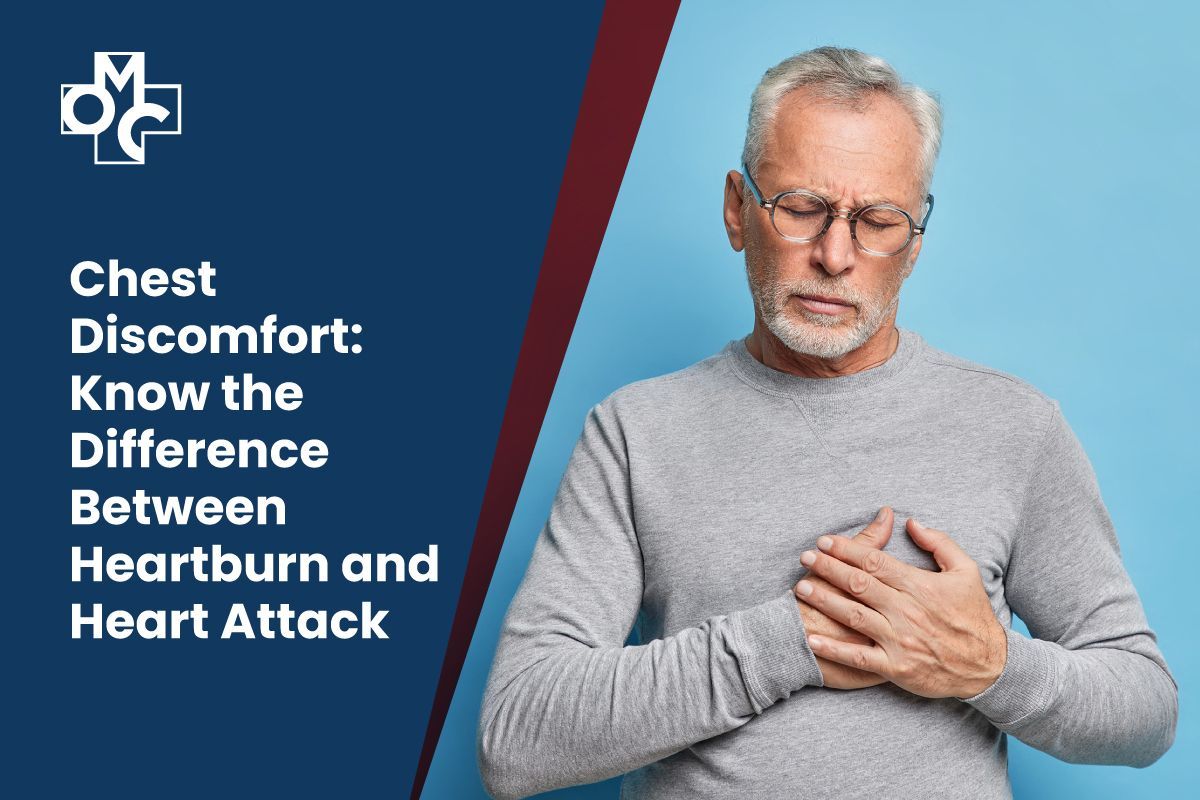Our Location
Elige tu idioma:
Chest Discomfort: Know the Difference Between Heartburn and Heart Attack

Chest discomfort can be a symptom of many different conditions, and it can be challenging to determine whether it is due to a heart attack or heartburn. It is hard to distinguish heartburn from a heart attack in most cases. Heartburn is a common digestive issue, whereas a heart attack is a severe medical emergency. Knowing the difference between the two is crucial, as it can help you seek prompt medical attention in case of a heart attack. This blog will discuss the difference between heartburn and heart attack, the symptoms, causes, risk factors, and treatment options.
Heart Attack vs. Heartburn
A heart attack is a potentially fatal medical emergency that happens when the heart's blood supply is cut off, harming the heart muscle. Plaque accumulation in the arteries that feed blood to the heart is the most frequent reason for a heart attack. A blood clot prevents the heart from receiving blood when this plaque breaks. Other factors that can contribute to a heart attack include:
- High Blood Pressure
- High Cholesterol
- Diabetes
- Smoking
- Obesity
- Family History of heart disease
Another factor to note is the difference between heart attack and gastric pain. Heart attack and gastric pain are two distinct medical conditions that can cause chest discomfort, but different factors cause them. A heart attack is brought on by obstructed blood flow to the heart. In contrast, stomach discomfort is brought on by various
digestive system issues, such as ulcers or stomach lining inflammation.
For further understanding, some of the FAQs about the difference between heart attack and
gastric pain include:
Q: How can I tell if a heart attack or gastric pain causes my chest to hurt?
A: The symptoms of a heart attack include prolonged soreness or pain in the chest that lasts longer than a few minutes. Moreover, it causes pain or discomfort in the arms, back, neck, jaw, or stomach, shortness of breath, nausea or vomiting, dizziness or lightheadedness, and sweating. In contrast, Gastric pain symptoms include a searing or gnawing ache in the upper abdomen, bloating, nausea or vomiting, and loss of appetite.
Q: How is a heart attack treated?
A: Treatment for a heart attack typically involves medications such as aspirin, beta-blockers, or nitroglycerin and medical procedures such as angioplasty or coronary artery bypass surgery.
Q: How can I prevent gastric pain?
A: Lifestyle modifications such as avoiding trigger foods, eating smaller meals, and reducing stress can help prevent gastric pain. Over-the-counter antacids or acid reducers, prescription medications, and surgery in severe cases can also help treat gastric pain.
On the other hand, heartburn is a common digestive issue that can cause a burning sensation or discomfort in the chest, often accompanied by an unpleasant aftertaste in the mouth. It is caused by acid reflux, the esophageal reversal of stomach acid flow. Heartburn is not a medical emergency; it can be relieved by antacids or other over-the-counter medications.
What’s the primary cause of heartburn?
The primary cause of heartburn is acid reflux, where the lower esophageal sphincter malfunctions (LES), enabling stomach acid to flow back into the esophagus. Other factors that can contribute to heartburn include:
- Eating a large meal or lying down immediately after a meal
- Drinking alcohol, carbonated beverages, or coffee
- Smoking
- Obesity
- Pregnancy
Some of the common FAQs to take note about the difference between heartburn and chest pain include:
Q: How can I tell if my chest pain is heartburn or a heart attack?
A: Heartburn symptoms include a burning sensation or discomfort in the chest and an unpleasant aftertaste in the mouth. On the other hand, the symptoms of a heart attack are more severe. It often includes chest pain or discomfort lasting more than a few minutes or coming and going in the arms, back, neck, jaw, or stomach, shortness of breath, nausea or vomiting, dizziness or lightheadedness, and sweating.
Q: Can heartburn cause chest pain?
A: Yes, heartburn can cause chest pain. The discomfort is often characterized as a scorching feeling that can sometimes be felt in the throat and chest. It is typically felt after eating, particularly after large or spicy meals. It may be relieved by antacids or other over-the-counter medications.
Q: Should I seek medical attention if I experience chest pain or discomfort?
A: It is important to seek medical attention if you experience chest pain or discomfort, as it can signify a serious underlying condition such as a heart attack.
Symptoms of Heart Attack vs. Heartburn
It is important to understand the differences between heart attack and heartburn symptoms. They can sometimes be similar. The symptoms of heartburn include a burning sensation or discomfort in the chest. Sometimes, it can be mistaken for heartburn chest pain. It is also important to note that chest pain and heartburn are two distinct symptoms. Chest pain can come from various symptoms, including heartburn. A sour or bitter taste in the mouth often accompanies heartburn symptoms.(Regurgitation of stomach acid and pain that worsens when lying down or bending over).
The
symptoms of a heart attack are more severe. They can include chest pain or discomfort that persists for a long time. It may come and go. You may also experience aching and pains in the arms, back, neck, jaw, or stomach. Also, shortness of breath, nausea or vomiting, dizziness or lightheadedness, and sweating. It's crucial to remember that
women may have symptoms other than men. Some examples are weariness, back discomfort, or jaw pain.
Don't Ignore the Signs! Learn How to Distinguish Between Heartburn and Heart Attack Today.
Experiencing chest discomfort can be a cause for concern, and it's important to know the difference between heartburn and a heart attack. While heartburn is usually a minor condition that can be treated with lifestyle changes or over-the-counter medications, a heart attack is a serious medical emergency that requires immediate attention. By understanding the symptoms and seeking prompt medical care when necessary, you can take proactive steps to safeguard your heart health.
With the help of healthcare professionals here at Ocana Medical, you can learn how to identify the signs of chest discomfort and get the care you need to stay healthy. Our services give elders access to preventive healthcare, treatments for current illnesses, and much more.
Book an appointment by calling us at (813) 968-8314 or emailing
info@ocanamedicalcenter.com for more information. Visit our
home page to learn more about our services.
Ocana Medical, located in Tampa, FL, aims to bring you as much information as possible to keep you healthy. We're in this together. #ocanacares
“Respect. Compassion. Quality. Integrity. These are the values on which Ocana Medical Center was built. Our aim isn’t just to treat you today. We hope to earn your trust and be your healthcare provider for life.”
©2023 Ocana Medical Group, Inc.
USEFUL LINKS
GET IN TOUCH
Call Us Today
Send us Email
Our Location
Ocana Medical Center | All Rights Reserved.












